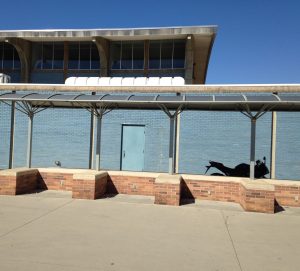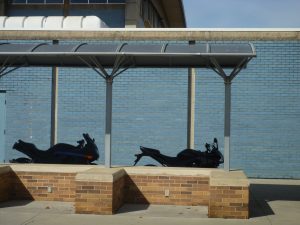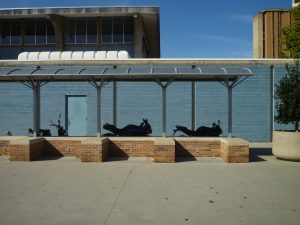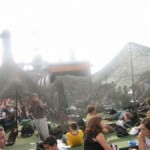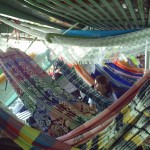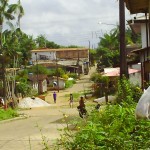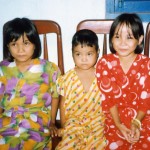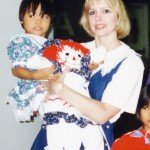Marie’s Olde Towne Tavern, despite the gentrified spellings, is an unremarkable joint on the north edge of downtown Knoxville, with the clientele one would expect from its location only a block from the Greyhound bus station.
But Marie’s does sport one thing that no other bar in town does. On the wall there is a framed, autographed photo of former University of Tennessee football player Rod Harkleroad. And on this October Saturday Rod insisted that I experience it. “I gave them an exclusive, so it’s the only bar in town where you can see it,” he said.
The year was 2002 and I was accompanying Rod on his ritualistic game-day circuit.
I had known Rod since grammar school – he and I had knocked helmets for a couple of years when we were about 12 or 13. Because we were the two biggest guys of our group, we always did the choosing when teams were picked. When we became semi-organized, with regular Friday-afternoon games, he quarterbacked the Stompers, I led the Bruisers. We played in the side yard of Danny Meador’s house, our only equipment being the ball and, for some, helmets. We imagined our games were the talk of Burlington, the working-class east Knoxville neighborhood where we lived.
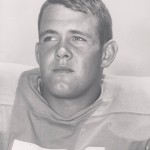
Rod in his Vol uniform, 1964
Rod had gone on to play high school football, had made all-state as a senior and had received a scholarship to the University of Tennessee. He didn’t play much – on the depth chart, he was behind Bob Johnson, now enshrined in the College Football Hall of Fame. But Rod was active in the Vols’ Lettermen’s Club and kept up with his old teammates.
I was trying to find a different perspective for a story on UT football and had decided that hanging out with the old players prior to a game could work. Rod liked the idea and agreed to get me inside the Lettermen’s Club before a game.
We decided on the Arkansas contest because its 8 p.m. kickoff would give us plenty of hanging-out time. And that’s why we were at the Olde Towne at 1 p.m. Marie’s was our third stop of the day. Rod, after a successful career coaching high school football, was now in the food-service business, and he had pre-game meetings with a couple of clients, providing food for their tailgate parties.
First, we made a delivery of yard-long sandwiches from Steamboat, a sub shop owned by another high school pal, Donny Anderson. The delivery was to Jefferson County, northeast of Knoxville. Then, after we had crossed back into Knox County, we stopped at a liquor store.
“I’m going to let you drive,” Rod said. I took the keys to his van and he mixed Jack Daniels and Sprite in a plastic cup. “I’ve got to meet another client at 3 at Riverside Tavern, so we’ve got time to stop by Marie’s.”
After my eyes adjusted to the lack of light in the bar, I found Rod’s picture. He was in full uniform except for his helmet, looking fierce in a dropback blocking stance. “Nice, huh?” Rod said. “Enough to make me a regular here.”
After we finished our brews and fended off a half dozen entreaties from a beer-begging crone, we left Marie’s. “Swamp Rat’s on the air by now,” Rod said. “And Mrs. Parker needs to call in.”
Swamp Rat was Dewey Warren, who played quarterback for UT when Rod was on the team. He now was host of a call-in sports talk radio show. And Mrs. Parker? That was Rod, using his best soft, refined, feminine voice. We got in the van, Rod got out his cellphone, and soon had Dewey on the line.
“Mr. Warren?” he said. “This is Mrs. Parker and I was just calling to discuss the finer points of the game.”
The Swamp Rat was a legend among the Big Orange faithful, and Mrs. Parker had become a star of his show, especially on game days. Today, Mrs. Parker wanted to talk about quarterback Casey Clausen.
“I am reminded of breakfast time when I was a child,” she said. “We had to be quick if we wanted an extra biscuit. That young Mr. Clausen’s holding the ball too long and that’s why the young men on the other side break through and he gets his rear side blistered. He just needs to be quicker in order to get the last biscuit.”
Mr. Warren agreed, thanked Mrs. Parker and turned to another caller.
Mrs. Parker was bang-on in voice and manner, she did not take the game too seriously, and she possessed a propensity for double-entendre that was subtle enough to slip right by Mr. Warren and his producers. The voice disguise was perfect. “You know,” Rod said to me after he hung up, “Dewey didn’t figure out that I was Mrs. Parker until the third or fourth time she was on the show.”
I was now pulling into the parking lot of the Riverside Tavern, a popular spot within walking distance of Neyland Stadium. The Riverside, though it too was a “tavern,” had nothing else in common with Marie’s. The gameday crowd consisted of the more successful Big Orange boosters. True, some might be as drunk as the old woman we had left at Marie’s. And they might be overly friendly, but they were more likely to want to buy a stranger a drink than to try to cadge one.
Rod swapped opinions on the game with his client, and then charmed a tableful of Arkansas fans with a “soooie pig.”
We then set out on foot for the serious tailgaters, it now being only four hours to kickoff. It was too early, Rod said, for much action at the Lettermen’s Club.
There were a couple more client stops and a brief visit with a local politician at his set-up before we made our way to Danny Meador’s spot. Danny, my old Bruiser teammate, was now president of a heavy-equipment firm and ran the company tailgate at UT games.
Rod and I regularly joined Danny and his company crowd, so we were expected. Another of Rod’s UT teammates, Paul Naumoff, would sometimes show up, and they would regale us with football stories. Paul, an all-star linebacker, had spent a decade heading up the defensive unit of the Detroit Lions before returning to Knoxville. During their college days, he and Rod had roomed together.
One of Paul’s favorite stories involved another linebacker, a player who partied with the same abandon that earned him All-American honors on the field. Among the other players, he was also known for his insistence when in search of drinking partners.
“That’s the reason I roomed with Rod,” Paul would say. “When he showed up at 3 a.m. drunk and rowdy, Rod would start preaching and praying for his soul. After a couple of those sessions, he left us alone.”
“But Paul,” Rod would add, “I prayed for your soul, too.”
Several drinks and stories later, Rod and I headed for the Lettermen’s Club – there was barbecue and it was close to 6 p.m. and I was hungry. Inside, I found what I was looking for – though it was not what I expected. Instead of insights into the TV games or the upcoming UT action, mostly what I heard were complaints about “these young guys not knowing how to play the game” or “not being tough enough to win the head-to-head battles.” They groused, I took notes, and Rod visited with former teammates.
Finally, it was 15 minutes until kickoff, the Lettermen’s Club was emptying, and the noise from the nearby stadium was drowning out normal conversation. We set out for our upper-deck seats.
About half-way up the entry ramp, I realized how tired I was. I was game-dayed out. I looked at Rod, who had been going longer than I had and who had drank a pint or so of bourbon to boot. He, too, looked tired.
“Do you really want to sit through three hours of football?” I asked him.
Feigning surprise, he looked at me askance. “You mean you don’t want to listen to my insights before each play? And what about all the folks around my seat – they expect me there to tell them what’s going to happen.”
I had joined Rod at games before, and what he said was true. As soon as the opponent’s defense was set Rod would call the play, and 75 percent of the time he was correct. Then he would regale us with derogatory comments about missed blocks and coverage. A game with Rod was always fun.
Once, I asked Rod why he had quit coaching. At his last job, at a rural school north of Knoxville, he explained, he had been forced to lock himself in his office after a night game and call the sheriff’s department because a father angry at his son’s lack of playing time was waiting outside.
“I decided there had to be a better way to make a living,” he said. “Besides, this way I can just tell everyone how it should be done without having to worry about winning or losing.” So he stayed involved in football, and was especially active with the Lettermen’s Club, helping out when any of his old teammates needed assistance.
But tonight, he was as tired as I was. We did a 360 on the ramp, Star Spangled Banner blaring in the stadium. We heard the roar of the kickoff as we made our way back to the van, and listened to the first few minutes of the game on the radio as I drove back to where my car was parked. Rod assured me that he would sleep in the van until the next morning (his habit after such episodes), and I went home. The next day, I read about UT’s victory. Casey Clausen threw a touchdown pass to Jason Witten in the game’s sixth overtime. The game ended at midnight.
A few months later, Rod was diagnosed with advanced cancer. But that did not stop him from helping an old teammate. Steve Delong, a two-time All-American who had a career in the NFL, had fallen down a flight of stairs. The resultant back injury left him wheelchair-bound. He was in a nursing home, and Rod was a regular visitor, frequently accompanied by other former teammates, including Elliott Gammage.
“Every week, we’d go see him,” Gammage recalled recently. “Steve was angry about his circumstances, but what Rod meant to Steve was unbelievable. Here Rod was dying of cancer, but he had time to visit Steve every week. Rod Harkleroad demonstrated the kind of courage that I pray I’ll have when I’m near the end.”
A couple of weeks before Rod’s death, Danny Meador and I visited him at home. In pain, he was in a lounge chair, his reactions slowed by painkillers. His wife Brenda, a nurse, was at work. A woman we didn’t know met us at the door.
“I’m Rod’s first wife,” she said. “Second,” Rod corrected her.
“We couldn’t live together,” she said with a smile. “But we’re still friends.”
He turned to us. “It’s tough when you’re dying, fellas,” he said. “They even bring in your ex-wives.” We all laughed, finding comfort in knowing that he hadn’t lost his sense of humor.
At Rod’s memorial service, dozens of former UT footballers showed up. Tales were told and there was a lot of laughter. One former teammate, Mike Price, repeated a favorite story, one that all the players knew. Rod, Mike, and Art Galiffa, a quarterback on the team during the mid-‘60s, were quail hunting one fall.
“We were taking a break, headed back to the trucks,” Price said. “Art and I had gotten in front of the others when one of the dogs went on point behind us. I hear a gun go off and next thing I know I’m on the ground and blood’s going everywhere. They start trying to find where I’ve been shot, undoing my coveralls. Rod’s hysterical. We can’t find where the blood’s coming from. Finally I look at my hand and see that a pellet has gone through my thumb.
“Rod finally calms down and we head back to the truck to get a Band-Aid. Rod put his arm around my shoulder. ‘You know, Mike’ he said, ‘If I had to shoot anyone, I’m glad it was you’.”
‘Why?’ I wanted to know. ‘Why not Galiffa – I mean, he’s a cocky quarterback’.”
“Because,” Rod answered, “You’re such a nice guy.”
Several days after Rod’s death, several of his old teammates managed to fulfill one of his last wishes. They slipped into Neyland Stadium and surreptitiously scattered his ashes around Shields-Watkins Field.
“It’s good to know,” said Price, “that Rod’s there to tell the coaches when they’re messing up.”
